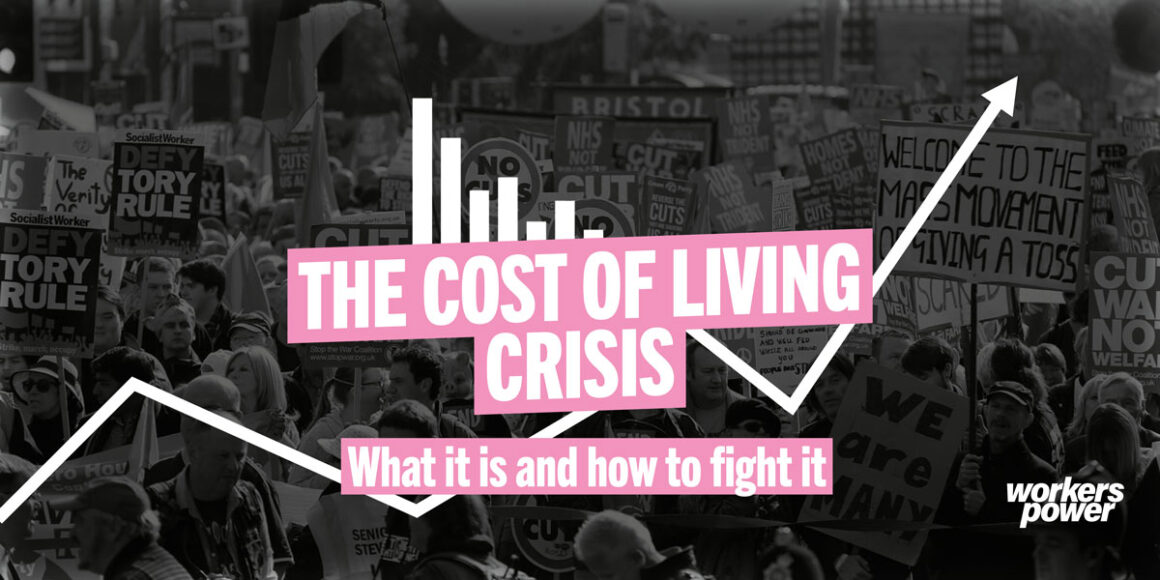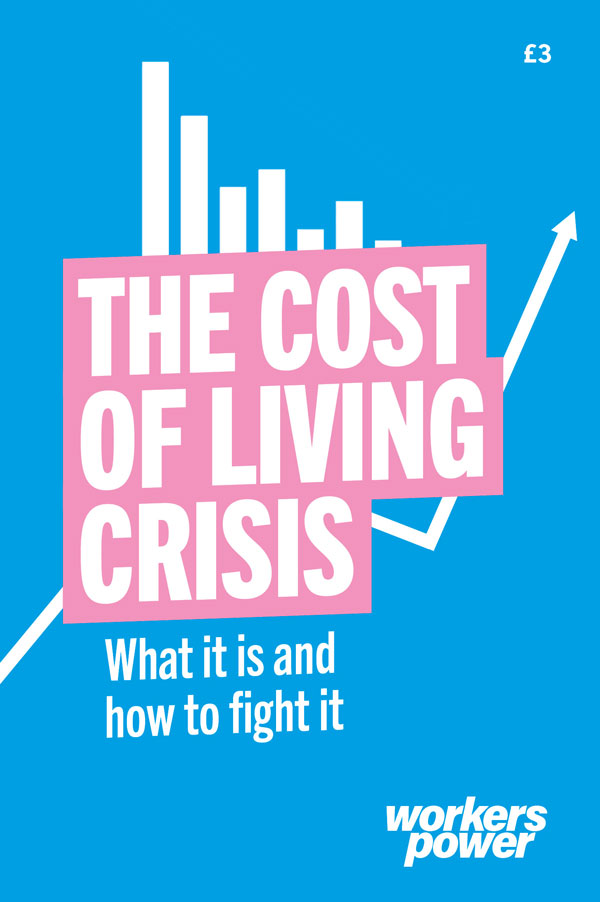

THE COST OF living crisis is an attack on the whole working class. It requires a class-wide response to force the rich to pay for the rising cost of living out of their profits. That is why we need a mass movement, rooted in the workplaces and communities, but united in strategy and struggle.
Many trade unionists, from bus and HGV drivers to rail workers and bin collectors, have won better pay deals through strike action. But the big guns – the TUC, Unite, Unison and GMB – have so far been missing in action at a national level.
Also two-thirds of our class remain outside the unions, particularly the poorer, more precarious sections close to the breadline already and the unemployed, youth and pensioners. High food prices, energy bills and rents will hit the most oppressed sections hardest: women, Black and other racial and ethnic minorities, young people, pensioners, the disabled and LGBT+ people.
How can we organise the unorganised, win strikes, build local organisation, and bring all this together into a mass, militant movement capable of defending pay, pensions and benefits and forcing the rich and big business to pay for the crisis?

Our new pamphlet analyses the cost of living crisis and outlines a programme of working class action to defend jobs, pay and public services. Get your copy for £3
Empower the rank and file
The wave of pay strikes by sections of workers is a big step forward, but even if successful, only those workers get a pay rise, which will then get eaten away by inflation. Strikes are crucial, but need to be combined with a political movement against the cost of living crisis — or our living standards will continue to fall.
We can’t rely on the official leadership to take the initiative. Even the positive role of some union leaders turning to strikes — most notably, Sharon Graham, general secretary of Unite — has limits.
The strikes are sector by sector, company by company, city by city. Tactics are also limited: strikes of only a short duration, insufficient to win; ‘pausing’ the action each time there’s a marginally improved offer; keeping within the tight restrictions set by the draconian anti-union laws.
We need more militant tactics to defeat hard-nosed bosses, like flying pickets, staying out until an acceptable deal is signed. These must be organised at the grassroots level. If our leaders are unwilling to lead, the rank & file must.
The answer isn’t just to replace the right wing union leaders with lefts but to focus on organising in the workplace. That doesn’t mean simply building from below or around the union structures, but also turning official union meetings into real ‘councils of war’, debating a plan of action and carrying it out directly. ‘Workers decide, officials provide’ – not the other way round.
It means organising the militant minority of workers in every union into a rank and file movement that can throw its energy behind every positive move by the union leaders, while going beyond them where they fail or obstruct a fight. This can unleash the deep wellspring of workers’ energy, determination and desire to fight that we can see on display in the more successful strikes but is stifled by the bureaucratic machinery most of the time.
We can see the strengths and weaknesses of the union leaders already. Unite has kept all its strikes separate and localised, for example calling dozens of Stagecoach bus strikes but allowing each to take action and negotiate separately, rather than levelling up all workers by demanding the parent company settle a national pay claim.
Unison’s full-timers have so withered its workplace organisation by neglect and witch-hunts that they could not get 85% of its members even to vote in NHS and council pay ballots. The GMB led a good strike on Eastbourne buses, winning 11%… then turned around and signed a sweetheart deal with Deliveroo behind other unions’ backs.
As for the TUC, gone are the days when it called action — though we should demand it calls a mid-week day of action, up to and including strikes, in the Autumn. The truth is we have to place demands on these leaders but be prepared to defy or act without the officials when necessary.
Build local action committees
Activists should use the mobilisation for 18 June to initiate local action committees, if they haven’t already done so. That is the order of the day.
What they are called does not matter. Whether they are set up by trades councils, local people’s assemblies or just ad hoc cost-of-living campaigners, the aim must be to continue their existence after the big march.
We must shun sectarian conflicts over the branding of campaigns or petty squabbles with groups we politically disagree with. Likewise, we must avoid being told what to do by unelected leaders. The People’s Assembly is for the first time calling for local groups to be set up, but in 10 years it has never called a decision-making conference or elected its officers.
No to top-down decision-making and appointed leaders. No to our aims and actions being dictated from above. No to divisions based on minute points of difference and who controls the contact sheets. Yes to unity and democracy — build from below!
In the past local trades councils have been the traditional starting point for organising industrial action on a class-wide basis, but many have become moribund, hamstrung by TUC regulations. Now is the time to brush off the cobwebs, cast off the shackles and put these councils on a fighting footing.
The immediate task is to produce effective campaigning materials — leaflets, press releases, Facebook and WhatsApp groups, posters, etc. Stalls on the high streets, visits to picket lines and leafleting of workplaces will start to identify new activists and mobilise greater numbers as the crisis begins to bite and workers begin to look for answers.
Action committees need to call meetings in towns, cities and boroughs to plan solidarity actions with local strikes, particularly on the railways. Many other sections are already balloting for strikes, like the posties, or soon will, like the PCS. Others, like fast food workers and couriers, desperately want to be organised. We need to support them, with large numbers leafleting their workplaces or joining their picket lines.
We need to build solidarity for strikers, so they can stay out longer. We need to help spread the action. We need to start coordinating strikes, so they gather momentum and have a greater chance of success. And we need direct action to amplify our message and embarrass the profiteers.
Our aim has to be to develop these action committees so they draw in representatives or delegates from all the workplaces, unions and neighbourhoods as possible. As they do their authority to initiate actions without recourse to official structures will grow. They can become alternative bases of power to the bureaucratic reformist leaders. In short they can develop into councils of action.
Political battle
Far from being divisive, bringing politics into the unions helps organise the wider struggle — in working class neighbourhoods and estates. This will strengthen the union struggle, building membership, organising solidarity, and amplifying our impact. It will create the best conditions for coordinating strikes and cementing the militant wing of the unions.
However, Keir Starmer’s Labour Party is an obstacle rather than a lever to help our struggle. Labour puts forward timid policies that the Tories easily cherry-pick, like the windfall tax, pushing aside conference-agreed policies, like the nationalisation of energy companies. Starmer and the bulk of the leadership refuse to support a rail strike, denouncing it as ‘disruptive’. His strategy is to tail the Tories so he can govern like the Tories.
The unions should follow Unite and the CWU’s lead by cutting funding and support for those Labour MPs and councillors that refuse to support workers or, as in Coventry, scab on their strikes.
The left opposition within the Labour Party, Momentum and the others, should put their energies into building a mass anti-inflation movement, which could put the Labour leadership, locally and nationally, under real pressure. That is more important now than passing conference motions that will be ignored or electing a few ‘socialist’ councillors who will pass austerity budgets.
Indeed, the struggles of both unions and movements would create the forces for a new working class party of struggle, one that opposes capitalism rather than manage it for the bosses.
Lessons from the past
The early days of Tory austerity from 2010 on saw a series of one-off mega-demonstrations leaving little behind in terms of concrete successes or organisation. They saw a magnificent one-day pension strike in 2011, involving a coordination of all the major public sector unions, but then the right wing union leaders broke ranks to sell out, betraying millions of workers who wanted to fight on.
Tragically the lefts accepted this as a fait accompli. Despite calling a thousand-strong rally on the eve of the pensions strike, the SWP refused to hold the left wing leaders like Mark Serwotka to account or warn of the impending sell-out. Only Workers Power supporters argued these points and called for joint local strike committees and a pledge to continue the action if the bureaucrats retreated.
Anti-cuts committees blossomed in every town and city, held protests and showed great promise. But they didn’t come together into a national movement. So they stagnated and failed to link up across the country. Eventually the bureaucratic People’s Assembly filled the vacuum with set-piece rallies with no consequence to them. It didn’t work — austerity rolled on unabated.
It will be up to those at the sharp end of pay cuts, job losses and austerity to organise the resistance this time round. Activists need to be ambitious and bring local movements together into a nationally coordinated united front, based on elected and immediately recallable delegates, to wage an effective common struggle towards a single goal: forcing the government to tax the rich, nationalise the big multinationals and raise living standards for all.
If we can do this, we can turn the cost of living crisis into a crisis for capitalism.

Our new pamphlet analyses the cost of living crisis and outlines a programme of working class action to defend jobs, pay and public services. Get your copy for £3